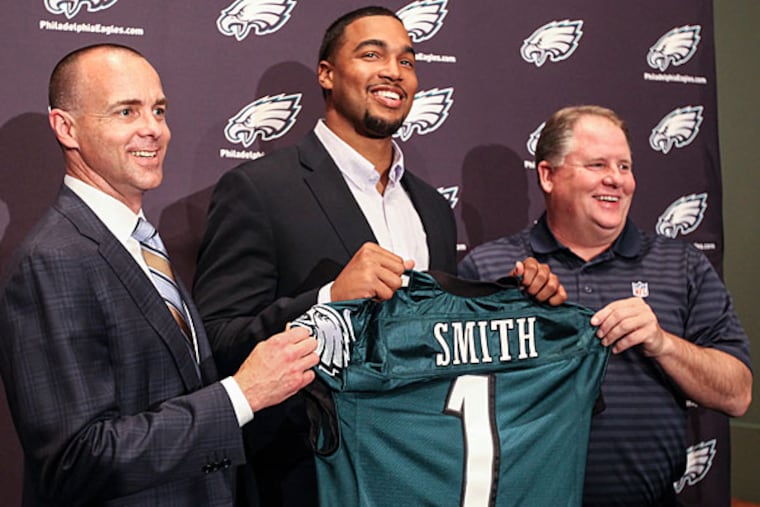Ex-Eagle Marcus Smith details suicide attempt, reminding us that draft busts are people, too | Early Birds
Mocked for not living up to his draft status, Smith seems to have found peace in retirement from football.

Top of the morning, Eagles fans. Hope you were able to get tickets if you are willing to brave the pandemic on Sunday to watch your team take on the Baltimore Ravens.
Also, if you like what you’re reading, tell your friends it’s free to sign up here. I want to know what you think, what we should add, and what you want to read, so send me feedback by email or on Twitter @lesbowen.
— Les Bowen (earlybirds@inquirer.com)
Marcus Smith isn’t in the NFL but is glad to be alive
Marcus Smith was a first-round pick the Eagles never really intended to make, chosen after a half-dozen prospects they coveted all were drafted before their 22nd overall slot arrived in 2014. They traded down to 26th and took Smith, a lean, speedy edge rusher from Louisville who’d played several positions in his career.
From the start, Smith was a bad fit, a player who showed little intuition or grasp of nuance, who wasn’t very strong, who didn’t seem to pick up concepts easily. He also seemed to lack confidence. Three years later, as training camp started in the Super Bowl season of 2017, Smith was released, after playing in 37 games, with four sacks. He migrated to Seattle, then Washington, where he played two games in 2018, then retired.
Apparently, there was more to Smith’s story than a lack of instincts or enthusiasm, however. He wrote this week in The Players' Tribune about his experiences with anxiety and depression, which culminated in an aborted suicide attempt one day when he was driving to practice with the Seahawks.
Smith wrote about starting to drift his car over the edge of a rocky ledge, when a phone call from his mother-in-law brought him back to himself. He said he drove on to practice.
“I got inside, found the trainers and told them that I’d tried to kill myself," Smith wrote. "They brought Pete [Carroll} down right away. I told him, ‘Coach, I can’t do this right now. I need to get help.’ I had tears pouring down my face and was barely able to express myself. I just felt hopeless.
"He said, ‘Football doesn’t matter anymore, Marcus. All you need to worry about is getting yourself healthy. Because you as a person, you as an individual … you have a family to protect. That’s all that matters.’
“The Seahawks released me the next day in order to allow me to seek the help I needed. They helped me connect with a therapist. They listened to me and truly played a part in saving my life. I will forever be grateful to them.”
Smith went on to talk about how, after he was diagnosed, he realized that those problems were part of his inability to succeed.
“My depression and anxiety led to a terrible, inconsistent diet that kept me from sleeping properly for months on end,” he wrote. "During training camp, I’d be running on one or two hours of sleep. My appetite would disappear for weeks on end, and when I did try to eat a proper meal, I’d throw it up.
“It was a vicious cycle. My anxiety would lead to a lack of sleep and inability to eat, which only fueled my anxiety even more.”
Smith, 28, married with a daughter, is much happier in his post-football life, in which he advocates for men to get help they might be reluctant to seek.
Smith was the target of a lot of vitriol from disappointed fans while he was here. It’s OK to be disappointed in a player who doesn’t live up to his billing. It’s less OK to extend that criticism beyond the player’s on-field shortcomings. It isn’t Smith’s fault that the Eagles drafted him so high.
What you need to know about the Eagles
In a strange gamble for a retooling, 1-3-1 team, the Eagles opted to risk running seventh-round rookie defensive end Casey Toohill through waivers so they could activate 32-year-old defensive end Vinny Curry from injured reserve. They lost the gamble. Toohill was claimed on waivers by Washington.
The Eagles' having a glut of healthy receivers is a difficult concept to wrap one’s head around, but that could happen, with DeSean Jackson and Alshon Jeffery close to returning. EJ Smith reports that Doug Pederson doesn’t want Travis Fulgham to get lost in the shuffle.
Jeff McLane, the Pauline Kael of the gridiron, is encouraged by what his film review shows about the Eagles’ young offensive linemen.
The ever-prescient Ed Barkowitz tells us some facts about Ravens quarterback Lamar Jackson, and looks ahead at other QBs the Eagles will face.
It isn’t clear what Lane Johnson learned from the second medical opinion he sought on his long-running ankle injury. Sounds like the Eagles are hoping Johnson can play this weekend, so he isn’t getting surgery right now, anyway.
From the mailbag
Has Mailata won the LT position, or is it his position to lose? — @answer_problem, via Twitter.
The latter. Jordan Mailata has shown encouraging signs in the two games he has started, against tough opponents, but he has hardly ensured a starting spot when Jason Peters returns. But Peters’ return from a thumb injury isn’t on the horizon yet, and Mailata has time to make sure management will want to see him play the rest of the season there.
If I were the Eagles, when Peters gets healthy, I would think about letting him play right guard, as he expected when he came back to the team in June. I think that at 38, Peters is better in a confined space than out at tackle. I also think he is better than Matt Pryor, who is currently playing right guard.